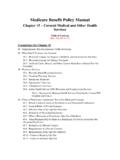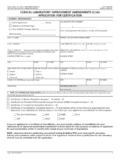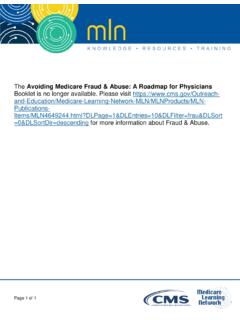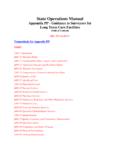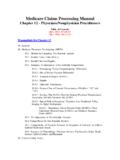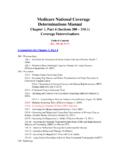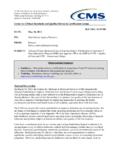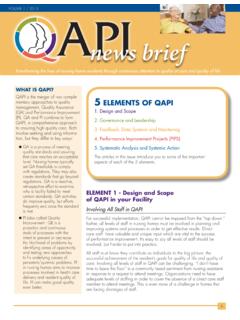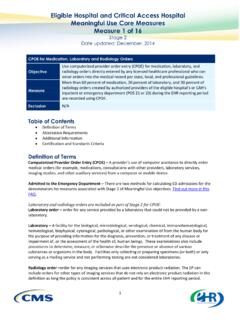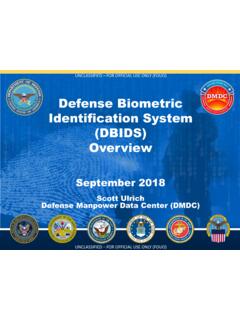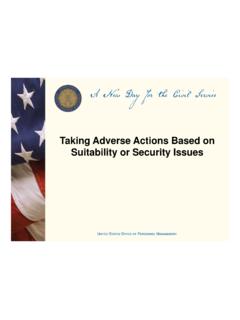Transcription of CMS Information Security
1 1 CMS Information Security 1 Information Security The federal Information Security Management Act of 2002 (Public Law 107-347) (FISMA) requires each agency to develop, document, and implement an agency-wide Information Security program to safeguard Information and Information systems that support the operations and assets of the agency, including those provided or managed by another agency, (including Subcontractors) or other source on behalf of an agency. That is, agency Information Security programs apply to all organizations (sources) which have physical or electronic access to a federal agency s computer systems, networks, or IT infrastructure; or use Information systems to generate, store, process, or exchange data with a federal agency, or on behalf of a federal agency, regardless of whether the data resides on a federal Agency or a Contractor s Information system.
2 This includes services that are either fully or partially provided; including other agency hosted, outsourced, and cloud computing solutions. The Contractor and all of its respective Subcontractors shall follow and remain compliant at all times with all CMS and federal Information Technology (IT) Security standards, policies, and reporting requirements, as well as all National Institute of Standards and Technology (NIST) standards and guidelines, other Government-wide laws and regulations for the protection and Security of Government Information .
3 All CMS Contractors shall comply with CMS policies and other requirements below, as well as documents referenced within those policies: CMS Policy for Information Security (PIS) (as amended) The high level CMS policy for the CMS Information Security Program, and is available CMS Policy for the Information Security Program (PISP) (as amended) - Sets the ground rules under which CMS shall operate and safeguard its Information and Information systems to reduce the risk and minimize the effect of Security incidents. This document will subsequently reference the Contractor-applicable Acceptable Risk Safeguards (ARS) manual and the Risk Management Handbook (RMH), Volumes I, II, and/or III) Security Standards and Procedures, and is available at CMS Policy for Investment Management and Governance (as amended)
4 - Establishes the policy for systematic review, selection/reselection, implementation/control, and 2 continual evaluation of IT investments at CMS, and is available at Cloud Services - For Cloud services1, all cloud-specific requirements will be as defined in Section , Cloud-based Services. However, for Information identified as Personally Identifiable Information (PII), Protected Health Information (PHI), and/or federal Tax Information (FTI), the additional Security and privacy requirements listed in the ARS manual Implementation Standards (as amended), as applicable to PII, PHI, and/or FTI, shall be applied within cloud-based services.
5 The CMS Information Security website at provides a list of applicable Security policies and procedures across the program. A summary of these requirements are listed in the Applicable Laws and Regulations sections of the above listed CMS policies, as well as in the Applicable Laws and Regulations section of the Health and Human Services (HHS) Office of the Chief Information Officer (OCIO) Policy for Information Systems Security and Privacy, available at GENERAL Information Security RESPONSIBILITIES The Contractor and all of its respective Subcontractors shall: A.
6 Establish senior management level responsibility for Information Security ; B. Define key Information Security roles and responsibilities within their organization; C. Comply with a minimum set of controls established for protecting all federal Information ; D. Comply with CMS policies and procedures for Information Security , as well as reporting requirements. SYSTEM Security OFFICER The Contractor shall appoint a Systems Security Officer (SSO) to oversee its compliance with the CMS Information Security requirements. The SSO responsibilities shall include implementation and oversight of all Information Security requirements and implementations.
7 1 As defined in National Institute of Standards and Technology (NIST) Special Publication (SP) 800-145, NIST Definition of Cloud Computing, as amended. 3 SYSTEM Security LEVEL The Contractor shall develop and apply appropriate Security controls to meet CMS Information Security requirements, as defined in the applicable appendix of the ARS manual (as amended), located on the CMS Information Security website at and in accordance with the below-listed parameters, for any/all tasks requiring the Contractor to (1) process, (2) store, (3) facilitate transport of, or (4) host/maintain federal Information (including software and/or infrastructure developer/maintainers)
8 , either at the Contractor site, or at a Federally-controlled facility (as defined in FAR Subpart ): A. Systems Security Level: Low, Moderate, or High as defined in the applicable appendix of the ARS manual, available on the CMS Information Security website at B. Information Type (as defined on the CMS Information Security website at ) is used to determine the Information system Security level. However, additional Security control requirements may be required based on the specific type of data available within the system. For Information identified as PII, PHI, and/or FTI, the additional Security and privacy requirements listed in the ARS manual Implementation Standards, as applicable to PII, PHI, and/or FTI, shall be applied.
9 C. E-Authentication Level 1, 2, 3, 4, or N/A, as defined in the CMS RMH, Volume III, Standard , Authentication, (available on the CMS Information Security website at ) shall be applied to proof, identify and authenticate authorized users. The contractor shall coordinate with the CMS Chief Information Security Officer (CISO) to assess and establish/update each of the above listed criteria within 30 days of contract award or when a Significant Change2 has been made to its system, as defined by the CMS CISO. STANDARD FOR ENCRYPTION The Government has determined that CMS Information under this contract is considered sensitive in accordance with federal Information Processing Standard (FIPS) 199, Standards for Security Categorization of federal Information and Information Systems, dated February 2004.
10 2 Significant Change means a change that is likely to affect the Security state of an Information system. NIST SP 800-37 R1 p. F-7. 4 The following encryption requirements apply to laptop computers, desktop computers, and other mobile devices and portable media that store or process sensitive CMS Information (at rest and/or in transit.) Device encryption shall occur before any sensitive data is stored on the laptop computer/mobile device, or within 45 days of the start of the contract, whichever occurs first.
